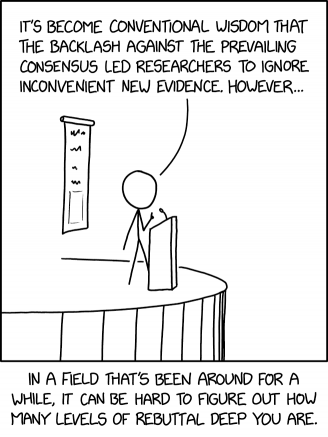2857: Rebuttals
| Rebuttals |
 Title text: The mainstream dogma sparked a wave of dogmatic revisionism, and this revisionist mainstream dogmatism has now given way to a more rematic mainvisionist dogstream. |
Explanation[edit]
| This is one of 62 incomplete explanations: Can Cueball's speech and the title text be explained better? How many levels of rebuttal is Cueball actually in? If you can fix this issue, edit the page! |
In the comic, Cueball is giving a lecture to present a scientific result in a long-standing field of study. He prefaces his speech by explaining the context of his research, but since the field has been around for a long time, the context is quite convoluted.
Here is a simplified version of what Cueball is saying:
"Most of us now assume the following: That when a lot of people didn't agree with what most experts said, the researchers stopped paying attention to new facts that didn't fit their ideas. But actually..."
The "backlash" that Cueball is referring to could be from the public, other researchers in the field, or both. If at least some part of the backlash comes from other researchers, then the researchers who "ignore inconvenient new evidence" could be those who support the prevailing consensus, or those who do not. Cueball would probably be understood by his audience, who are likely other researchers in the same field, but from a layman's perspective this explanation of the context surrounding his work would be unclear and insufficient.
Cueball is also likely arguing that this "conventional wisdom" is false, but it is not stated what exactly about the wisdom is false. For example, it could be that
- the researchers are still paying attention to new evidence that doesn't fit their ideas;
- the evidence isn't new to the researchers;
- the new evidence actually strengthens the researchers' ideas.
Here is a simplification of the title text. The words and their meanings are color-coded accordingly.
The mainstream dogma sparked a wave of dogmatic revisionism , and this revisionist mainstream dogmatism has now given way to a more rematic mainvisionist dogstream.
The widely-held beliefs which people thought were indisputable sparked a wave of other people revising those beliefs based on other principles also thought to be indisputable. This popular tendency to revise beliefs and lay down new principles as undeniably true regardless of evidence has now given way to a more rematic mainvisionist dogstream.
"Rematic mainvisionist dogstream" is an example of a spoonerism. Here the first syllable of the words "dogmatic", "revisionist" and "mainstream" are switched: "Dogmatic" becomes "rematic" (from "revisionist"), which becomes "mainvisionist" (from "mainstream"), which becomes "dogstream" (from "dogmatic").
There is some credence to the idea that scientific study is sometimes dogmatism and sometimes revisionism. In the book The Structure of Scientific Revolutions by Thomas Kuhn, he proposes that progress in science is described by alternating periods of "normal science" and revolutionary science. As the ideas put forth in the revolutionary science phase become more accepted amongst the scientific community, they can be adopted into a part of normal science. But since normal science is simply the regular work of scientists, who use a lot of procedures to verify hypotheses and eliminate false ones, it cannot be considered as dogmatism. Also, the word "revisionism" specifically refers to rewriting a common view of historical events, and not scientific theories.
Transcript[edit]
- [Cueball, hand raised with a finger held up, stands behind a lectern on a high podium speaking into a microphone on the lectern. Behind him is a banner, with four lines of illegible writing above a (blank) picture at the bottom.]
- Cueball: It's become conventional wisdom that the backlash against the prevailing consensus led researchers to ignore inconvenient new evidence. However...
- [Caption below the panel:]
- In a field that's been around for a while, it can be hard to figure out how many levels of rebuttal deep you are.
Discussion
Ok, so...
- "...new evidence" (yes, possibly we can start with "...evidence", but let's start with the first contrarianism).
- "...inconvenient..." (so there's something we're saying is wrong with that new evidence?)
- "...led researchers to ignore..." (maybe could fold in with the inconvenience, but arguably ignoring is a 'third way' step in sidelining it, not even disagreeing)
- "...the prevailing consensus..." (another layer of implied position-taking where there is something to disagree with)
- "...the backlash against..." (to which others firmly took up the contrary)
- "It's become conventional wisdom that..." (and this is a counter-contrary perspective)
- "However..." ("...and I, for one, think that they're wrong about the whole thing!")
...well, by a very quick and dirty deconstruction. But, then again, I fully expect to be shown wrong in my delayering! 162.158.74.25 00:31, 21 November 2023 (UTC)
- Wouldn't the inconvenient new evidence be the justification for the backlash against the prevailing concensus, not the reason why the new evidence is ignored? I'm not going to try to explain this comic, I'm lost already. Barmar (talk) 00:46, 21 November 2023 (UTC)
- It was the backlash that ignored the new evidence. The new evidence wasn't adopted by the 'backlashers', as I read it, so couldn't be their justification. (Or at least that's how the conventional wisdom interprets it, which of course could be wrong!) 162.158.34.23 00:56, 21 November 2023 (UTC)
- I agree, and the first couple of paragraphs of the explanation are currently wrong in suggesting that the "prevailing consensus" is the one to which the researchers ignoring evidence ascribe. Instead we have a position that most scientists accept to be true and have done for some time ("prevailing consensus"), but this has inspired a revolt that is implied to be more emotively-driven than facts-based ("backlash") leading to revolt-inspired research ("has led researchers") uncovering evidence ("new evidence") which did not fit the revolting researchers' preconceived ideas ("inconvenient") and has therefore not been properly taken into account ("ignored"); however, this description of the situation is one that is generally assumed to be true, without critical thought or despite proof to the contrary ("conventional wisdom"), and Cueball is about to tell us why ("however..."). In truth, Cueball could be about to rebut any one of those things, but it is heavily implied to be the "conventional wisdom" that is in his view wrong, so there may actually be no prevailing consensus, or no real backlash, or no real research done because of that backlash, or no new evidence, or proof that that evidence could actually be useful to counter the prevailing consensus, or (and this again is most likely IMHO) it is wrong for people to assume that that the evidence was ever ignored. Therefore Cueball is about to support the revolting researchers, but only in rebutting the mainstream rebuttal accusing the rebutting researchers of failing to rebut contradictory evidence...172.69.223.169 10:05, 11 December 2023 (UTC)
- It was the backlash that ignored the new evidence. The new evidence wasn't adopted by the 'backlashers', as I read it, so couldn't be their justification. (Or at least that's how the conventional wisdom interprets it, which of course could be wrong!) 162.158.34.23 00:56, 21 November 2023 (UTC)
I impressed myself by correctly remembering that the author of "Structure of Scientific Revolution" was Thomas Kuhn. It was assigned reading in a philosophy of science class I took over 40 years ago, but I haven't had to think about it much since then. Barmar (talk) 00:43, 21 November 2023 (UTC)
Looking for a way to depict the Title Text: "The mainstream dogma sparked a wave of dogmatic revisionism, and this revisionist mainstream dogmatism has now given way to a more rematic mainvisionist dogstream." Too garish? 172.69.79.142 00:52, 21 November 2023 (UTC)
- I'm not typing color codes, but I figured it would make more sense to coordinate the color by compound word, not roots. So "dogma" would be one color, "mainstream" would be another, etc. And then "dogstream" would be two-tone. 172.70.178.11 09:47, 21 November 2023 (UTC)
- On that topic, I think the description for "rematic" should be changed to more clearly reflect the combination of "revisionist" and "dogmatic"; I don't think it implies any relation to "remake", "remix", "refurbish" or "recycle", even if the ultimate meaning is similar (and I'm not sure that's the case anyway). 162.158.90.161 17:27, 21 November 2023 (UTC)
...why is there a file of a chatgpt image of "ematic mainvisionist dogstream"?--Utdtutyabthsc (talk) 07:10, 19 January 2026 (UTC)
- The conversation you posted above ("Looking for a way to depict the Title Text: [...]"), that I've moved us down below (for it to still fit alongside), might have formed the primary reason. Though, IIRC, it was originally in the main Explanation page and maybe got moved here as "interesting artefact no longer wanted in the main bit". I think it's an interesting curiosity. Where it should be, I'm not sure, but it still makes me smile to see it. Would be a shame to 'lose' it entirely. (But also wouldn't want to encourage any more like it, either... I have that kind of ambivalence.) And there are far worse ChatGPT images out there... ;) 82.132.244.8 15:16, 19 January 2026 (UTC)
A simple explanation of "rematic mainvisionist dogstream" is that they are created by taking "re" from revisionist and replacing the "dog" from dogmatic which replaces the "main" from mainstream which then replaces the "re" of revisionist. Rtanenbaum (talk) 19:25, 21 November 2023 (UTC)
That's an excellent explanation, yet I'm still not sure I understand the comic. There may be just too many layers of meta. Barmar (talk) 16:22, 21 November 2023 (UTC)
Unclothed evidence would certainly be inconvenient, to say no more, in the puritanical Church of Scientific Dogma. 172.70.210.40 17:39, 21 November 2023 (UTC)
